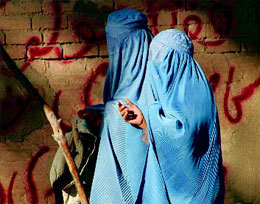THE TALIBAN may have been ousted, but Afghanistan’s women are still facing major prejudices.
This was the message from Sahar Saba of the Revolut-ionary Association of Women in Afghanistan (RAWA), who spoke in Dublin last week.
Saba joined four male panellists at the public debate sponsored by the Irish Anti-War Movement for a discussion on the conflict that has raged in Afghanistan since the US-led invasion in October 2001.
“For women, the whole disaster in Afghanistan started with the United States. We cannot forget their participation in the conflicts of the 1970s and ’80s,” she said, in reference to the US funding of the Afghan muhjahideen during the Soviet invasion of Afghanistan.
After the Soviets were defeated, many muhjahideen fighters who had been supported and armed by the US and other countries turned to civil war. The Taliban gained control of the country as a result of this conflict, ruling from 1996 to the invasion of 2001 and the formation of the Hamid Karzai-led republic.
“The Northern Alliance has been no better for women in Afghanistan,” said Saba. “Their politics, mentality, treatment of women are no different. They just want their share of the power.”
She was also critical of those who believe that escalating the conflict to negate the returning influence of the Taliban and Afghan warlords will bring Afghanistan into peace and stability.
“No nation can be liberated if freed by another country,” said Saba. “The biggest reason the US will never be successful is because they are bringing back the same warlords, the same people who already ruled.”
Jonathan Neale, an American author and critic of the war who also sat on the panel, offered a different explanation for the mistreatment of women since the fall of the Soviet invaders.
“Leftist politics [and] feminism in Afghanistan will always be linked with the Soviet Union,” said Neale, who lived in Afghanistan for two years in the 1970s.
“It would be as if leftists and feminists in the United States during the late ’70s and ’80s murdered 10 million Amer-icans. You wouldn’t expect anyone in the United States to be a feminist, would you?
He added: “The Taliban did deliver law and order, even though people did not like them. There was law and order compared to the days right after the Soviets.”
While criticism of the US-led coalition forces in Afghanistan was strong, much of it coming from Americans at the forum, several Irish panellists felt that the American government was unfairly bearing the brunt of criticism for its military operations in Afghanistan.
“Supporting the war is supporting a UN effort and it cannot be squashed into the template of just American foreign policy,” said Richard Waghorne, a journalist for the Irish Daily Mail who made it clear he was speaking for himself and not his employer.
“I think we need to think of the consequences of withdrawal, which include the Taliban’s return. I don’t see how anyone who considers themselves a proponent of human rights could support such an action.”
July looks to be the deadliest month for American and international troops so far, with over 45 soldiers killed in action.
British Prime Minister Gordon Brown has rejected calls to withdraw Britain’s troops after a particularly brutal 24-hour period in which eight British soldiers were killed.
Meanwhile, US President Barack Obama has pledged to increase troop levels in Afghanistan until the country is stabilised.












